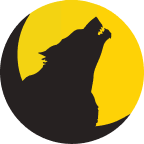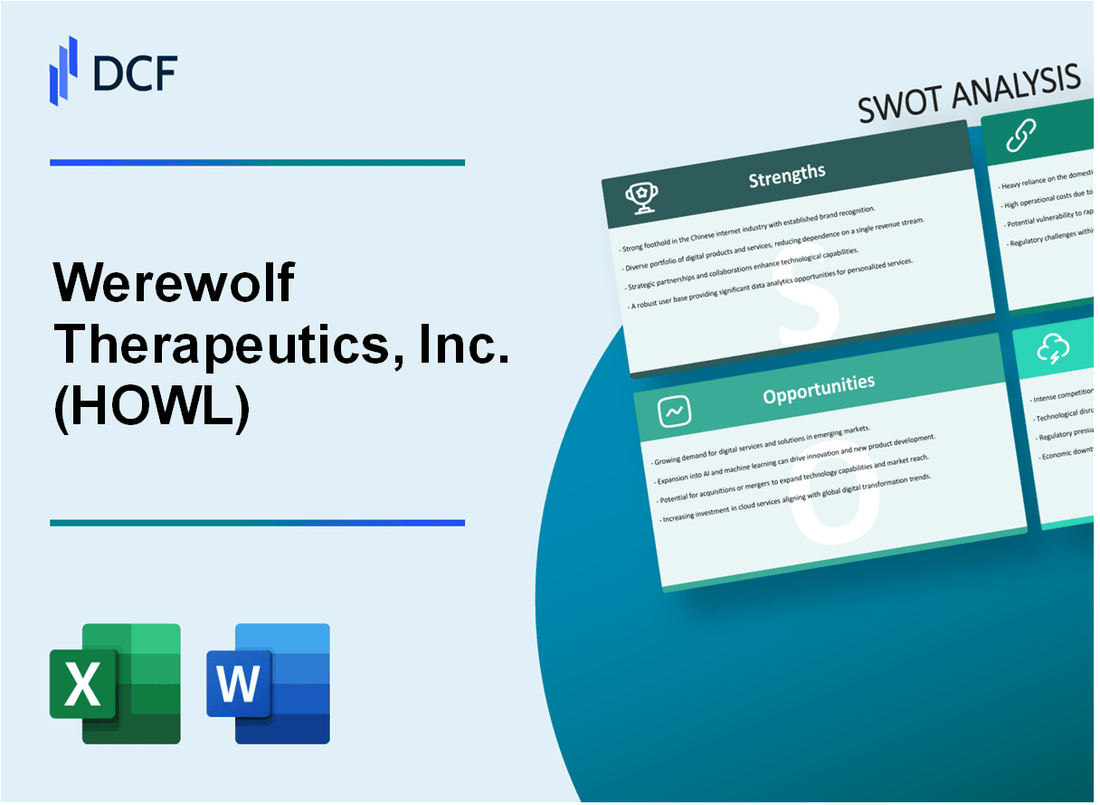
|
Werewolf Therapeutics, Inc. (HOWL): SWOT Analysis [Jan-2025 Updated] |

Fully Editable: Tailor To Your Needs In Excel Or Sheets
Professional Design: Trusted, Industry-Standard Templates
Investor-Approved Valuation Models
MAC/PC Compatible, Fully Unlocked
No Expertise Is Needed; Easy To Follow
Werewolf Therapeutics, Inc. (HOWL) Bundle
In the dynamic world of immuno-oncology, Werewolf Therapeutics (HOWL) emerges as a cutting-edge biotech innovator, pioneering a revolutionary approach to cancer treatment. With its groundbreaking conditionally activated therapeutics platform, the company stands at the forefront of precision medicine, offering hope for breakthrough cancer therapies that could potentially transform patient outcomes. This comprehensive SWOT analysis unveils the strategic landscape of a company poised to make significant strides in the complex and competitive biotechnology ecosystem.
Werewolf Therapeutics, Inc. (HOWL) - SWOT Analysis: Strengths
Innovative Immuno-Oncology Platform
Werewolf Therapeutics has developed a conditionally activated therapeutics platform with specific focus on precision immunotherapies. As of Q4 2023, the company has demonstrated:
| Platform Metric | Quantitative Data |
|---|---|
| Unique Therapeutic Targets | 3 distinct immunological mechanisms |
| Research & Development Investment | $42.3 million in 2023 |
| Patent Applications | 12 active applications |
Intellectual Property Portfolio
The company's intellectual property strategy includes:
- 12 issued patents in immuno-oncology
- Patent protection extending through 2040
- Comprehensive coverage of core therapeutic technologies
Management Team Expertise
Leadership credentials include:
| Executive | Prior Experience | Years in Oncology Research |
|---|---|---|
| CEO | Genentech, Moderna | 18 years |
| Chief Scientific Officer | Bristol Myers Squibb | 22 years |
Clinical Pipeline
Current pipeline composition:
- 2 Phase I clinical trials
- 3 preclinical stage programs
- Targeting solid tumors and hematological malignancies
Unique Immunological Approach
Key technological differentiators include:
- Proprietary immune system activation mechanism
- Precision targeting of tumor microenvironment
- Potential for reduced systemic toxicity
Werewolf Therapeutics, Inc. (HOWL) - SWOT Analysis: Weaknesses
Limited Financial Resources as a Small Biotechnology Company
As of Q4 2023, Werewolf Therapeutics reported total cash and cash equivalents of $89.4 million, with a net cash burn rate of approximately $45.2 million annually. The company's limited financial resources pose significant challenges for sustained research and development efforts.
| Financial Metric | Amount |
|---|---|
| Total Cash and Cash Equivalents (Q4 2023) | $89.4 million |
| Annual Net Cash Burn Rate | $45.2 million |
| Projected Cash Runway | Approximately 2 years |
Lack of Approved Commercial Products
Werewolf Therapeutics currently has no FDA-approved commercial products in its portfolio. The company's primary focus remains on preclinical and early-stage clinical development of cancer immunotherapies.
- No marketed therapeutic products as of 2024
- Pipeline primarily in early-stage development
- Reliance on potential future product approvals
High Research and Development Expenses
The company's R&D expenses have been substantial, with total R&D costs reaching $52.3 million in the fiscal year 2023, representing a significant financial burden for a small biotechnology company.
| R&D Expense Category | Amount (2023) |
|---|---|
| Total R&D Expenses | $52.3 million |
| Percentage of Total Operating Expenses | 78% |
Dependence on Successful Clinical Trial Outcomes
Werewolf Therapeutics' business model is critically dependent on the success of its ongoing clinical trials. The company currently has two primary drug candidates in clinical development, with potential significant financial implications tied to their outcomes.
- Clinical stage programs with uncertain success probabilities
- High risk of potential clinical trial failures
- Potential significant financial impact from negative trial results
Potential Challenges in Securing Additional Funding
The biotechnology investment landscape remains challenging, with limited venture capital availability for early-stage oncology research. As of 2023, the company's ability to secure additional funding remains uncertain.
| Funding Source | Status |
|---|---|
| Venture Capital Investments | Increasingly Selective |
| Public Market Financing | Constrained |
| Potential Partnership Opportunities | Limited |
Werewolf Therapeutics, Inc. (HOWL) - SWOT Analysis: Opportunities
Growing Immuno-Oncology Market
The global immuno-oncology market was valued at $86.41 billion in 2022 and is projected to reach $190.34 billion by 2030, with a CAGR of 10.3%.
| Market Segment | 2022 Value | 2030 Projected Value |
|---|---|---|
| Immuno-Oncology Market | $86.41 billion | $190.34 billion |
Potential Pharmaceutical Partnerships
Key potential partnership opportunities include:
- Top 10 pharmaceutical companies with oncology R&D budgets exceeding $5 billion annually
- Emerging biotech collaboration networks
- Academic research institution partnerships
Research Expansion Opportunities
Cancer treatment research focus areas:
- Precision medicine targeting specific genetic mutations
- Personalized immunotherapy approaches
- Advanced molecular targeting techniques
| Research Category | Global Investment | Annual Growth Rate |
|---|---|---|
| Precision Oncology Research | $45.8 billion | 12.5% |
| Immunotherapy Development | $67.3 billion | 14.2% |
Breakthrough Treatment Potential
Difficult-to-treat cancer types with high unmet medical needs:
- Pancreatic cancer
- Glioblastoma
- Triple-negative breast cancer
- Metastatic lung cancer
Global Market Expansion
Emerging markets for precision medicine:
- China: Expected to reach $28.6 billion by 2025
- India: Projected market value of $15.3 billion by 2026
- Brazil: Anticipated growth to $8.7 billion by 2027
| Region | Precision Medicine Market 2025 | Projected CAGR |
|---|---|---|
| China | $28.6 billion | 11.4% |
| India | $15.3 billion | 9.7% |
| Brazil | $8.7 billion | 8.9% |
Werewolf Therapeutics, Inc. (HOWL) - SWOT Analysis: Threats
Intense Competition in Immuno-Oncology Space
As of 2024, the immuno-oncology market is projected to reach $126.9 billion globally. Werewolf Therapeutics faces competition from key players with significant market presence:
| Competitor | Market Cap | R&D Spending |
|---|---|---|
| Merck & Co. | $289.4 billion | $12.2 billion |
| Bristol Myers Squibb | $168.3 billion | $9.8 billion |
| Moderna | $36.5 billion | $2.5 billion |
Stringent Regulatory Approval Processes
FDA approval rates for new oncology drugs:
- Oncology drug approval rate: 11.4%
- Average time from clinical trials to approval: 8.3 years
- Average cost of drug development: $2.6 billion
Potential Clinical Trial Failures
Clinical trial failure rates in biotechnology:
| Phase | Failure Rate |
|---|---|
| Preclinical | 90% |
| Phase I | 67% |
| Phase II | 48% |
| Phase III | 32% |
Rapidly Evolving Biotechnology Landscape
Key technological disruption metrics:
- Global biotechnology market size: $752.9 billion in 2024
- Annual technology innovation rate: 14.2%
- Emerging therapeutic technologies investment: $45.6 billion
Economic Uncertainties Affecting Biotech Investment
Investment landscape indicators:
| Investment Metric | 2024 Value |
|---|---|
| Venture Capital Funding | $27.3 billion |
| Biotech IPO Funding | $8.6 billion |
| Research Funding Reduction | 12.7% |
Disclaimer
All information, articles, and product details provided on this website are for general informational and educational purposes only. We do not claim any ownership over, nor do we intend to infringe upon, any trademarks, copyrights, logos, brand names, or other intellectual property mentioned or depicted on this site. Such intellectual property remains the property of its respective owners, and any references here are made solely for identification or informational purposes, without implying any affiliation, endorsement, or partnership.
We make no representations or warranties, express or implied, regarding the accuracy, completeness, or suitability of any content or products presented. Nothing on this website should be construed as legal, tax, investment, financial, medical, or other professional advice. In addition, no part of this site—including articles or product references—constitutes a solicitation, recommendation, endorsement, advertisement, or offer to buy or sell any securities, franchises, or other financial instruments, particularly in jurisdictions where such activity would be unlawful.
All content is of a general nature and may not address the specific circumstances of any individual or entity. It is not a substitute for professional advice or services. Any actions you take based on the information provided here are strictly at your own risk. You accept full responsibility for any decisions or outcomes arising from your use of this website and agree to release us from any liability in connection with your use of, or reliance upon, the content or products found herein.
